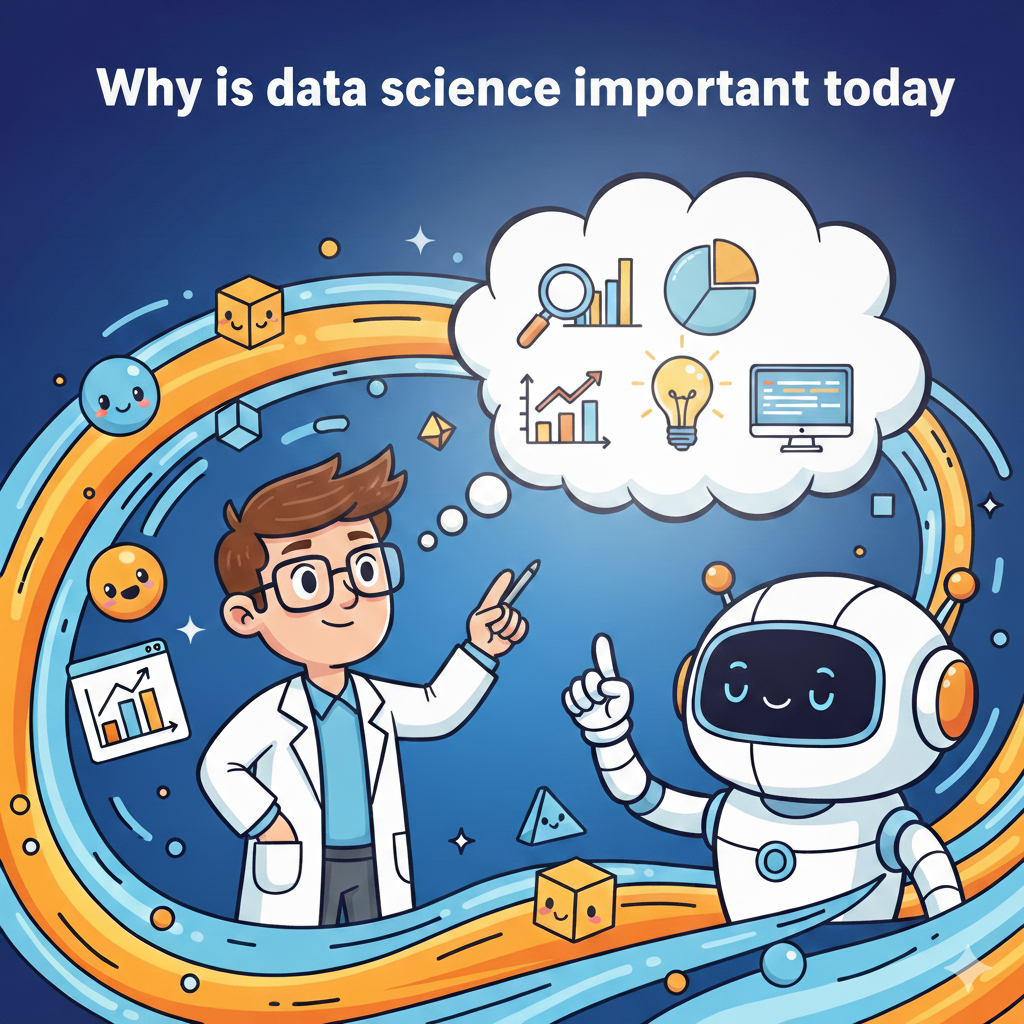In today's world, where technology and analytics are rapidly changing, data science stands as the “heart” of decision-making, innovation, and a race where every sector is striving to get that competitive advantage. Ranging from government-based organizations to NGOs, from startups to unicorn-level enterprises, the ability to precisely harness data has become important. This blog highlights the key reasons why data science plays a pivotal role, followed by challenges faced, some examples, and its future scenario.
1.Promoting Data-Based Decision Making
- Mammoth volumes of data are gathered by organizations, sourced from customer interactions, social media, IoT models, and many more. However, the issue is that raw data is not very useful until it undergoes precise extraction. Here is where data science comes into play.
- Data science effectively helps in converting the gross data into meaningful information from which businesses can make formal decisions rather than relying on instincts.
- With [data science models](https://www.geeksforgeeks.org/data-science/data-science-modelling) now making the unpredictable predictable with ease, accompanied by statistical analysis, they can help organizations to catch up to trends, predict risks, and formulate strategies.
2.Operation Efficiency and Cost Reduction
- Workflow Streamlining: Through the use of process mining, analyzing supply chain activities, and the use of prediction, organizations can keep continuous visuals on workflows, reduce downtime of processes, cut overhead expenses, and manage inventories efficiently.
- Empowering workforce: Using automated labor that is controlled by algorithms will accelerate production processes, save time by reducing manual labor, and help employees focus on high-value work. There are many [data science articles](https://www.datacamp.com/blog/category/data-science) that explore how innovation emerges from strategies that are based on precise data.
- Decision Making: By providing evidence-based information, data-driven decisions help operations go smoothly. Dashboards also provide real-time information, helping to adapt to fast changes in the market.Case studies in [data science blogs](https://www.datacamp.com/blog) often portray the relation between operational efficiency and profitability.
3.Innovative Business Models
- Deep Customer Understanding: Data science analyzes the needs of customers and makes marketing strategies cut out specifically for them. By understanding what customers want, the respective goods will be delivered more frequently, leading to higher customer satisfaction and loyalty.
- Competitive Advantage: By providing data-driven and streamlined solutions, businesses relying on data science can gain a competitive advantage over others who rely on a plain approach. Also, the ability to quickly adapt to the trends will help in keeping the business informed and hence, keeping it ahead in the race.
- Finding New Opportunities: Data science, with its ability to check the market for changes in customer requirements, helps businesses adapt accordingly.Insights from the data management of a shift or creation of a new trend help businesses develop new products and launch them head-on into the market to cater to the unmet needs.Trusted [data science websites ](https://www.datacamp.com/)show many examples of how businesses can boost themselves through analytics.
4.Risk Management and Fraud Detection
- Quick Detection:Data science can quickly identify anomalous behaviour in fields like finance, insurance and cybersecurity.
- Use of Sturdy Mechanisms:Techniques like anomaly detection, clustering, network analysis effectively help in detecting breaches in systems.With models built to forecast risks, businesses can mitigate the immediate damage rather than responding after the damage has already been done.
- Being aware:Frequent [data science news](https://www.datasciencecentral.com/) also show how machine learning can be used to stop cybercrime and safeguard institutions.
5.Art of Staying Relevant
As more and more companies continue to adopt data science, those that are lagging behind in analytics have greater chances of being outperformed. Data-driven competitors can react faster to market changes, optimize marketing spend, improve customer retention, and enter new markets backed by evidence. In many industries, data science is no longer a luxury; it’s like a basic need to stay in the game.Balancing theory and practice by working on real-time projects, exploring how different existing tools work and also exploring new tools, focusing on core skills like machine learning and statistical programming is crucial to be relevant.Many articles on data science highlight how studying personalization and customer need drives higher engagement and retention.
6.Public Good and Policy Making
Governments and non-profits also use data science extensively for public health check,disaster management, resource allocation, and urban planning.Data science immensely helps assess impact of policies, understand demographics and monitor the favourable outcomes.From customer perspective, data science helps companies to divide customers into segments, understand their choices, and providing real time analytic data in fields of retail, healthcare and streaming services.This helps improve customer experience and in turn leads to more crowd control, more satisfaction and loyalty.
7.Challenges To Be Sorted
Of course, just as there is “no rose without thorn”, the field of data science has its dark sides as well, mainly caused by biasing and funding issues which leads to businesses going corrupt.
- Data Ethics:Privacy must be maintained while collecting and analyzing data.Also individual privacy must be respected in accordance with the company as well as the national legal frameworks(e.g. GDPR[General Data Protection Regulation] )
- Data Bias Handling:Poor quality data or datasets which are biased can lead to conclusions deviating from the expected results. It must be ensured that the data is in a clean, proper representative way and has the foundational structure.
- Skill Issues:In recent scenario there has been high demand for data scientists, engineers and analysts.But supply is limited since most of the workforce do not have the proper skillset.Solution is continual learning and gathering knowledge in the respective domain.
- Cost management:Building sturdy pipelines, maintaining large computational and storage capacity can really take a toll on expenses.
- Building Trust:Implementing complex models like deep learning, can be hectic. Stakeholders often need models that are explainable to trust and act according to outputs.
8.Uses in Real-World
- Can be used in healthcare sectors to predict outbreak of a wide variety of diseases, optimizing patient care, and personalised medicines.
- Data science also has its uses in retail and e-commerce sectors in optimizing inventories and demanding for forecasting.
- In the finance sector, it can be used to detect fraudulent activities,algorithmic trading and credit score checking.
- It immensely helps transportation and logistics by optimizing the best route for deliveries and initiating autonomous driving research.
9.Future Scenario
Data science definitely has a bright future ahead with several trends to amplify its importance
- In Edge Computing and Real-Time Analytics it will definitely help in close processing of operations , near to where data is generated.
- In AI and Deep Learning, it can help make better models, more efficient algorithms, more interpretability.
- It can help combine text and images, possibly audio and video too, to create a richer and impactful insight benefiting multimodal data.
- It can certainly help in making models accessible in much simpler format to non-experts.
In today's era where data is given a high priority, data science is not just a word like any other. It is the backbone of growth, innovation and survival of civilizations. From enhancing customer experiences to making operations more streamlined. From creating innovative business models to helping the government make policies for the betterment of the society, data science really transforms the approach on how we take decisions.While there are certainly challenges revolving around ethics, privacy biasing and managing cost of infrastructure the trains make it clear that embracing data science is indispensable.One such partner that is helping organisation in this arduous journey is Infigon Futures which offers specialised services and solutions in data analytics machine learning and data-based transformations.
10.FAQs
Q1. What is data science?
Ans: data science is basically and inter disciplinary field that combines many courses like statistics computer science domain expertise to extract various valuable insights from both structured and unstructured data
Q2.How does data science differ from the traditional method of analytics ?
Ans:The key difference is that traditional method follows on descriptive statistics, that is, what has actually happened.On the other hand data science follows two perspectives that are very much relevant in the modern era; both the predictive approach and the prescriptive approach. It does this by combining machine learning and advanced data science models .
Q3.Does every industry need data science ?
Ans:All Industries do not necessarily need data science for their approach. But industries will definitely benefit from using advanced machine learning immediately in areas such data-driven decision making, healthcare, retail, finance, travel,l logistics and many more.
Q4.What skills are needed to pursue a career in data science?
Ans:In order to pursue a career in data science core skills will be needed including statistics, programming languages like Python and SQL, machine learning, data visualisation and domain knowledge.

